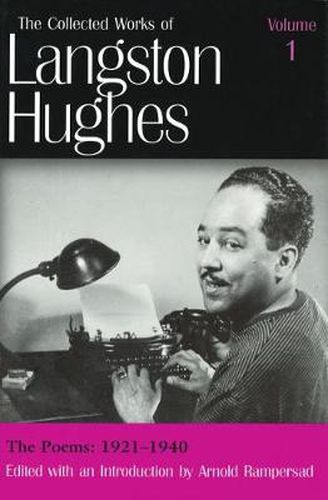Readings Newsletter
Become a Readings Member to make your shopping experience even easier.
Sign in or sign up for free!
You’re not far away from qualifying for FREE standard shipping within Australia
You’ve qualified for FREE standard shipping within Australia
The cart is loading…






The first three volumes of Missouri’s landmark Collected Works of Langston Hughes comprise all of his published poetry. Although he worked in a variety of forms, Hughes was above all a poet. From 1921, when his first poem.
The Negro Speaks of Rivers,
appeared in a national magazine, until 1967, when his last volume appeared shortly after his death, he remained faithful to his central goal - to be a poet of the African American and American experience, creating verse that honored the culture of black American and the ideals of the nation. Volume 1 includes the complete texts of Hughes’s first book, The Weary Blues (1926), and his second, Fine Clothes to the Jew (1927), as well as other poems published by him during and after the Harlem Renaissance. The Weary Blues announced the arrival of a rare voice in American poetry. A literary descendant of Walt Whitman ( I, too, sing America,
Hughes wrote), he chanted the joys and sorrows of black America in unprecedented language. A gifted lyricist, he offered rhythms and cadences that epitomized the particularities of African American creativity, especially jazz and the blues. His second volume, steephed in the blues and controversial because of its frankness, confirmed Hughes as a poet of uncompromising integrity. Then, in the 1930s especially, came the radical poetry included in Dear Lovely Death (1934) and A New Song (1938). For example,
Good Morning Revolution
and
Let American Be America Again
made his pen one of the most forceful in America during the Great Depression.
$9.00 standard shipping within Australia
FREE standard shipping within Australia for orders over $100.00
Express & International shipping calculated at checkout
The first three volumes of Missouri’s landmark Collected Works of Langston Hughes comprise all of his published poetry. Although he worked in a variety of forms, Hughes was above all a poet. From 1921, when his first poem.
The Negro Speaks of Rivers,
appeared in a national magazine, until 1967, when his last volume appeared shortly after his death, he remained faithful to his central goal - to be a poet of the African American and American experience, creating verse that honored the culture of black American and the ideals of the nation. Volume 1 includes the complete texts of Hughes’s first book, The Weary Blues (1926), and his second, Fine Clothes to the Jew (1927), as well as other poems published by him during and after the Harlem Renaissance. The Weary Blues announced the arrival of a rare voice in American poetry. A literary descendant of Walt Whitman ( I, too, sing America,
Hughes wrote), he chanted the joys and sorrows of black America in unprecedented language. A gifted lyricist, he offered rhythms and cadences that epitomized the particularities of African American creativity, especially jazz and the blues. His second volume, steephed in the blues and controversial because of its frankness, confirmed Hughes as a poet of uncompromising integrity. Then, in the 1930s especially, came the radical poetry included in Dear Lovely Death (1934) and A New Song (1938). For example,
Good Morning Revolution
and
Let American Be America Again
made his pen one of the most forceful in America during the Great Depression.